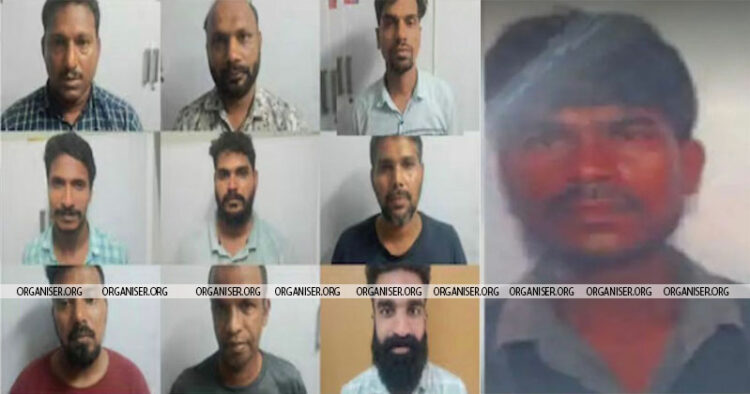A dalit migrant worker from Bihar was brutally lynched to death in the Kondotty region of the Malappuram district of Kerala on May 13; as per the reports, the cold-blooded murder of the dalit youth, later identified as Rakesh Manjhi (36) was perpetrated by some locals who tied and tortured him before killing him in cold blood.
The fateful incident is said to be of May 13 night when a few locals, later identified as Fazil Shafudhin, Muhammad Afzal, Mehboob Ahmad Samad, Habib, and their associates, allegedly on suspicion of theft, tied down Rakesh and thrashed him brutally; it’s been learnt that the victim has been mercilessly tortured for at least two hours before he met a painful death by assault.
It’s been learnt that plastic pipes and sticks brutally thrashed the youth for at least two hours, and when his body became unresponsive, the assaults carried his body to a local junction, following which a few locals informed the police. Learning about the incident, a police team, after reaching the spot, immediately rushed Rajesh to the nearby healthcare in Kozhikode, where he succumbed to his injuries.
It’s been reported that the victim, Rajesh, was previously working in the Pattambi area, and it was only a couple of days before that he had arrived in Kondotty. The deceased is said to have arrived in Kizhisseri to work in a chicken shop; he was reported to be a resident of Madhepura in Bihar.
The Kerala police, on the other hand, have so far arrested as many as eight persons pertaining to the barbaric act and confirmed that the murder of the tribal youth was a case of mob lynching; the police confirmed that the perpetrators had also tried to tamper the evidence including the CCTV footage though the police team has recovered photographs from accused phones and CCTV footage of the spot is being recovered.
It’s been learnt that the assailants initially tried to float up a fake story and claimed that the victim fell from a building’s terrace and sustained serious injuries. However, the postmortem of the deceased confirmed bruise marks on his body and broken bones, suggesting torture.
It is to be noted that law and order in Malappuram districts on many occasions have drawn national attention in the past; the Muslim majority district of Kerala is also considered the hub of the sleeper cells of radical outfits like Popular Front of India (PFI) and ISIS.
It is worth mentioning here that this is not the first time that the southern state has witnessed a barbaric act of mob lynching, as several cases of lynching have come to the fore from the left-ruled state in the last few years. Earlier in a similar incident, a tribal youth identified as Madhu, a resident of Attapadi, was also lynched to death by as many as 16 people in Mukkali near Mannarkkad of Palakkad district in February 2018.
Similar charges of theft were also framed against Madhu, who was captured from a nearby cave by the prime accused Hussein and his associates; it was learnt that the tribal youth was beaten mercilessly by the assaulting gang for allegedly stealing some food; he was later handed over to the police who immediately rushed him to hospital where he succumbed to his injuries.
On March 3, the special SC/ST Court in Mannarkkad, Palakkad District, Kerala, had found as many as 14 accused guilty of the lynching; on March 5, the court pronounced seven years of rigorous imprisonment to as many as thirteen convicts and three months for the other accused.

In February this year, another youth, Vishwanath, a resident of Kalpetta from Wayanad district, was also found hanging from a tree in Kozhikode medical college premises on February 10, 2023; it was reported then that Vishwanath had arrived at Kozhikode with his pregnant wife, who gave birth to a child a day before the incident.
It’s been reported that Vishwanath was allegedly questioned about a stolen mobile phone and some money by a mob and the security guards. He was in extreme grief and anguish; later, his body was found hanging from a tree.
Though the police, after recovering the body, claimed it to be a case of suicide, the relative of the deceased alleged that Vishwanath was not even known to climb a tree. Only after the state Human rights commission took a suo moto, the police were forced to change the cause of the death to an ‘unnatural one.’
It is to be noted that while the stray cases of lynching from other states of the country have been widely discussed and propagated by the liberal media as an epitome of growing intolerance in the country, similar incidents of atrocities against the marginalised sections in the southern state has been deliberately ignored by the same media conglomerates.




















Comments